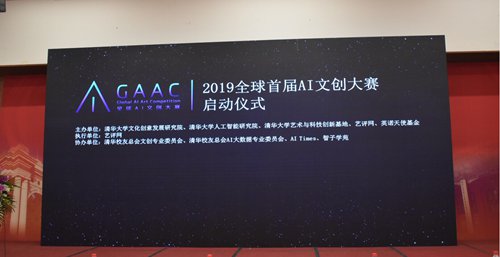HOME >> ARTS
The opening gceremony of Global AI Art Competition kicks off in Tsinghua University
By Chen Xi Source:Global Times Published: 2019/6/26 18:48:40

Global Artificial Intelligence Art Competition kicked off with an opening ceremony at Tsinghua University in Beijing on Tuesday. Photo: Chen Xi/GT
The Global Artificial Intelligence Art Competition (GAAC), which aims to select excellent cultural and creative industry products, kicked off with an opening ceremony at Tsinghua University in Beijing on Tuesday.
Designers looking to compete have until February 2020 to submit their projects to the competition organizers by email.
Tsinghua aims to establish GAAC as a learning exchange platform and potential project incubation platform for institutions and business groups working in the field of artificial intelligence (AI), art creation, and cultural and creative research.
The winning products will be introduced to investment institutions and put into actual use to promote the integration of AI art into China's intellectual design industry.
"We plan to collect more than 300 cultural and creative industry projects through this competition, and might introduce them into people's daily lives if the projects are mature enough," Kong Zhong, the founder of GAAC, told the Global Times.
"If technology can meet people's material needs, then technology plus cultural creation can satisfy people's spiritual requirements," Hu Yu, the dean of the Institute for Culture Creativity at Tsinghua University, told the Global Times.
Hu pointed out that China's middle class has grown to 400 million, as such the demand for cultural and creative industry products has greatly increased.
This type of special artworks covers a wide range of fields including music, dance, painting and poetry.
For example, one program uses AI to produce a poem based on words typed into it, according to Sun Maosong, a professor at the Institute for Artificial Intelligence in Tsinghua University.
However, some people worried that AI might replace people's jobs.
"Some people say AI might cause painters to lose their jobs since an AI technology can now create decent paintings, but I disagree. I think AI can actually help people produce better artworks," said Yan Hong, a member of the China Artists Association, during a panel held at the opening ceremony.
According to Hu, while technology can replace some basic and repetitive jobs such as carrying out research it cannot replace creative jobs, which will encourage people to try to engage in more meaningful jobs.
GAAC has established long-term strategic partnerships with hundreds of university research institutions, AI laboratories, cultural and creative enterprises, and investment and financing institutions around the world.
"We will mainly focus on creativity and its practicality when judging projects in the competition, and we look forward some creative works to make their debut in the competition," Sun told the Global Times.
Posted in: ART